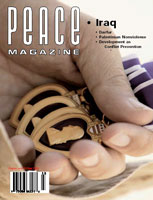
Peace Magazine Oct-Dec 2004, page 31. Some rights reserved.
Search for other articles by PMag staff here
If the Pentagon had hoped to demonstrate the effectiveness of its missile defence system before the November election, that aspiration has been acknowledged to be impossible. The system is designed to send interceptors into space to knock down enemy warheads. Often, however, the system's tests have failed, making it necessary for the chief weapons evaluator to estimate that the system may be able to hit its targets only 20 percent of the time. Another test flop during the presidential campaign would be worse than embarrassing to the Republican cause, and Democrats are widely charging that further tests have been deferred to avoid this political problem.
Nevertheless, present plans still call for the system to be put into operation before the end of 2004.
Source: Bradley Graham of the Washington Post
Vice Presidential candidate Senator John Edwards (D-NC) has said that if elected to the White House, the Democratic administration would offer asylum to scientists secretly building illegal nuclear weapons in foreign countries. Edwards stated at North Carolina University's Wilmington campus, "We will send a message to those nuclear scientists: If you want to come clean and expose an illegal weapons program, then we will help you and we will protect you."
Edwards also said that President George W. Bush has not done enough to stop the spread of weapons of mass destruction ... Edwards claimed, "The administration has stood on the sidelines while they advanced their nuclear programs."
In an interview with the Washington Post Edwards said Presidential Candidate Senator John Kerry (D-MA) would also offer Iran a deal allowing it to keep its nuclear power plants if it gave up the right to retain bomb-making nuclear fuel. Edwards told The Washington Post if Iran did not accept this "great bargain," it would confirm the Islamic state was building nuclear weapons under cover of a nuclear power initiative ... Such an offer to Iran would signal a shift in US diplomatic relations with Iran, which were severed after the 1979 revolution. President George W. Bush included Iran in his "axis of evil" along with North Korea and Iraq.
Source: Agence France-Presse, 30 Aug. 2004; The Washington Post, 30 August 2004.
On 23 August, workers at the Hanford Nuclear Reservation celebrated the completion of a project to remove millions of gallons of liquid radioactive waste from old, leak-prone tanks. State and federal officials called the achievement a major milestone in the decades-long cleanup of Hanford .
For 40 years, the Hanford reservation made plutonium for the nation's nuclear weapons. Today, work there centers on a $50 billion to $60 billion cleanup, scheduled to be finished by 2035. Much of the cleanup involves retrieving and treating 53 million gallons of highly radioactive waste from plutonium production. The liquid, sludge, and salt cake sit in 177 aging underground tanks.
Most critical was the liquid waste in 149 tanks that had a single-wall construction, making them more susceptible to leaks as they age. The single-shell tanks, built between the 1940s through the 1960s, were designed to last only about 20 years. About 67 of the tanks leaked radioactive brew into the soil, contaminating the aquifer and threatening the Columbia River less than 10 miles away.
Five years ago, Washington state complained about the slow pace of the tank cleanup. The state and the Department of Energy (DoE) then agreed to a court-enforced timetable for removing waste from the 29 remaining tanks, and more than 3 million gallons of liquid waste was pumped out of the tanks and transferred to newer, safer doubled-walled tanks. The deadline for transferring the waste was September 30.
The DoE is required to have all the wastes removed from the single-walled tanks by 2018.
Once removed from the tanks, the waste will be turned into glass logs for long-term disposal.
Source: The Sunflower.
On 13 September, President Vladimir Putin announced radical changes in the organization of Russia's political system. He proposed that regional leaders no longer be elected directly by the voters. Instead, regional legislators would endorse candidates recommended by the president.
Putin suggested electing deputies to the Duma by the proportional, party-list system. The Election Commission has long been advocating this reform.
He also announced a ban on extremist organizations as "breeding grounds" for terrorism.
Source: RFE/RL.

Peace Magazine Oct-Dec 2004, page 31. Some rights reserved.
Search for other articles by PMag staff here